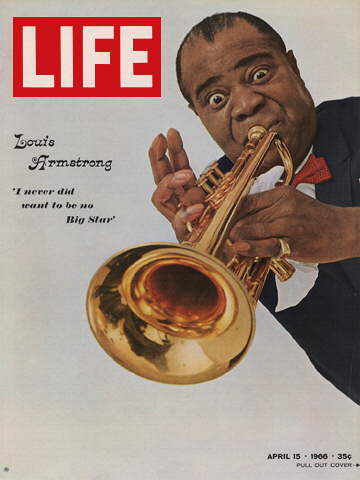Louis Armstrong: American Genius
“He is the beginning and the end of music in America.”
~Bing Crosby
“You can’t play anything on a horn that Louis hasn’t played.”
~Miles Davis
“The legacy of any nation in the world is their contribution…
We contributed Louis Armstrong.”
~Tony Bennett
When I hear his name, my heart is filled with both joy and anger at the same time.
The joy is derived from his music, and his charisma. Louis Armstrong is perhaps the single most profound influence on popular music today, that influence reaching far beyond jazz music. He was the consummate performer and artist and musician. American conductor and composer Leonard Bernstein said of Armstrong “Every time this man puts his trumpet to his lips, even if only to practice three notes, he does it with his whole soul”, and I believe it is this that encapsulates his passion for playing, but his impact and legacy go far beyond any simple quote.
I’ve heard it said that America’s two greatest contributions to the world were baseball and jazz. if this is true, then Louis Armstrong was jazz’s ambassador. Armstrong was instrumental in creating, defining, and evolving the music form we call jazz, which is in fact – along with blues, from hence it came – the first American music. As a virtuoso trumpet player, Armstrong had a unique tone and an extraordinary talent for melodic improvisation. It was through his playing that the trumpet emerged as a solo instrument in jazz and is still widely used today. In addition to his extraordinary skills as a soloist, he was also a masterful accompanist and ensemble player. With his innovations, he raised the bar musically for all who came after him. Never before had the world heard music played in such a way. And for better or for worse, Armstrong’s horn was a catalyst that took popular music from classical music and military marches to R&B and hip hop. Louis “Satchmo” Armstrong may very well be the only true American genius. And that thought brings me joy.
But there is another side to the story of Louis Armstrong that makes me angry.
My anger is at social injustice, prejudice, and the second class (if that) citizen treatment afforded him. Louis was born on August 4, 1901 in New Orleans, Louisiana, into a very different world… one which I cannot even conceive. Louis Daniel Armstrong was “colored”, and in the 1900s in the deep South (and sadly all across our nation), this was a strike against him. My outrage is that for most of his career, this man was celebrated enough to have headlined at grand ballrooms, Las Vegas casinos and prestigious hotels, but was was relegated to enter through the kitchen or back door because of the color of his skin. He wasn’t even permitted to walk the casino floor or stay in the rooms of the hotels and casinos in which he performed.
But he endured, and his music thrived in spite of the unimaginable prejudices he encountered. He would mug on stage, shuck and jive, and kowtow to white America, and he did it all with a smile on his face. A new generation of black musicians (Dizzy Gillespie in particular) criticized Armstrong for trying too hard to appeal to white audiences, suggesting that he was an Uncle Tom. Billie Holiday countered these criticisms, saying “Of course Pops [Armstrong] toms, but he toms from the heart.”
“I never tried to prove nothing, just wanted to give a good show.
My life has always been my music, it’s always come first, but the music ain’t worth nothing if you can’t lay it on the public.
The main thing is to live for that audience, ’cause what you’re there for is to please the people.”
~Louis Armstrong
In reality, Armstrong was neither oblivious nor unaffected, he merely watched and waited. This made it all the more effective and powerful when he did choose to speak out. Armstrong was a major financial supporter of Martin Luther King Jr. and other civil rights activists, openly calling President Eisenhower “gutless and two faced” for his inaction during the 1957 conflict over school desegregation in the South. In protest, Armstrong canceled a U.S. State Department-planned tour of the Soviet Union, saying “The way they’re treating my people in the South, the government can go to hell”.
And in the end, embittered by the treatment of blacks in his hometown of New Orleans, he chose to be buried in New York City.
On August 4, 2001, the centennial of Armstrong’s birth, New Orleans’s airport was renamed Louis Armstrong International Airport in his honor.
I will never be able to understand our nation’s mindset in Armstrong’s day. I just cannot grasp America’s abhorrent behavior. It wasn’t until 1972, the year after his death, that he was finally honored with a Grammy Lifetime Achievement Award by the Academy of Recording Arts and Sciences. A day late and a dollar short, in my opinion.
It’s likely that if Louis could speak to me he’d tell me it ain’t nothing… but that was his way.
“What we play is life.”
~Louis Armstrong
Happy Birthday Pops,
-Craig

